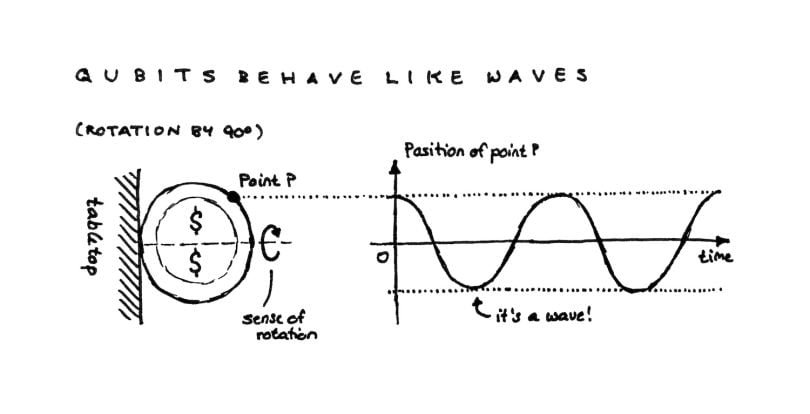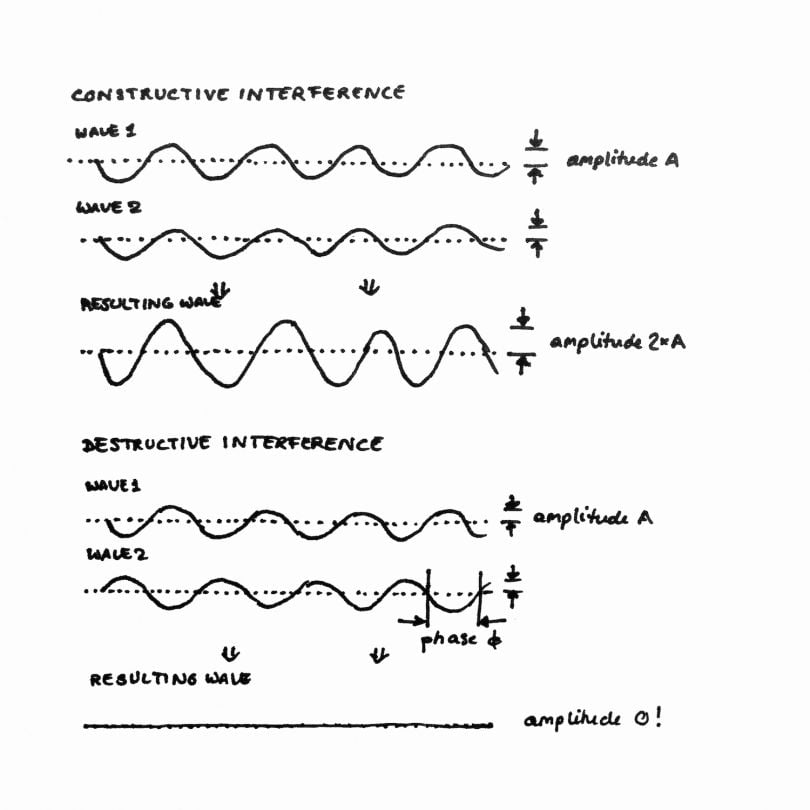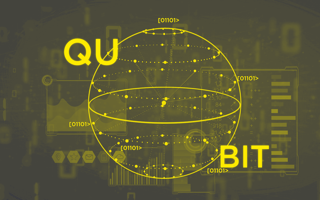In late 2019, Google built a quantum computer that could make a calculation in three minutes. That might not sound like much — you can order takeout for dinner with your phone in less time — but the same task would have taken a classical computer at least 1,000 years. This presented yet another milestone in the development of quantum computers. Judging by the sheer number of startups in the space, as well as the millions of dollars in funding, quantum computing seems to be the next big thing in tech.
Experts’ projections back that up: by 2025, the quantum computing market is projected to hit $770 million. Quantum cryptography alone might account for $214 million since it provides fundamentally unhackable connections that could add an extra layer of security across all fields, from finance to healthcare.
Given this information, investors are understandably looking to pour cash into startups dealing with quantum computing. Between 2017 and 2018, investors put more than $450 million into quantum computing. That’s more than four times the amount that was invested in the two years prior.
The question that nobody can answer yet is whether this surge in investments will result in a bubble. Once that bubble bursts, the market could cool off and result in “quantum winters,” analogous to AI winters: droughts of investment activity that have slowed the growth of AI multiple times in the last decades.
Whether or not the current boom is a bubble has many implications across the field. At this point in time, investing in or working at a quantum computing startup means setting up an uncertain future for yourself. This doesn’t mean that quantum computing won’t succeed in the long run, but you’ll need some deeper knowledge before making a decision.
Because of its incredible computing power, the quantum world might help to bring on new scientific breakthroughs, discover life-saving drugs, develop new materials to build more efficient devices and buildings, invent financial strategies to live well in retirement, and find new algorithms to quickly direct resources or manage supply chains. For now, however, some challenges remain to be overcome before we can truly speak about a “quantum revolution.”
Key Concepts of Quantum Computing
In short, quantum computers can store and process way more data on fewer processors than a classical computer. A classical processor encodes all information in sequences of zeros and ones, with each instance of a zero or one being one bit. A quantum processor stores information in qubits, which are the quantum analogue to bits. The difference is that each qubit can be a zero and a one at the same time, however.
Think about it like a coin: When lying on the table, it’s either heads or tails. But if you spin it, there’s no way to tell whether it’s heads or tails; in a sense, it is both. Depending on how it spins, there may be, for example, a 70 percent chance that you get heads and a 30 percent chance that you get tails once the coin comes to rest. This concept of being in two states at once is called superposition.
Since many qubits interact with one another, you end up with a set of probabilities that derives from measuring combinations of zeros and ones. This results in a much greater computing power than with classical bits. For example, each letter that you’re reading on your screen is encoded in a sequence of eight zeros and ones, or eight classical bits. Eight qubits, however, are the equivalent of 2^8, or 256 classical bits, because each qubit has two possible states. On an eight-qubit quantum computer, you’d therefore be able to write 32 letters instead of one single one.

The current state of the art is 50 qubits, and since the power increases exponentially, that processing capability means you could make a quadrillion — that is, 1,000 trillion — calculations at once. At the end of the process, you just measure the end result, i.e. measure the final state of each qubit, and your job is done. Even the biggest supercomputers can’t do that much processing.
Making 50 or more qubits work isn’t as easy as it sounds, however. Interference, a pretty basic phenomenon, makes the qubits quite error-prone. Earlier, I described qubits and their superpositions like a spun coin. Imagine now that two qubits are whizzing around like coins on a table. If you look at the position of a point on one of the coins at each instance in time, it looks like a wave (see figure). Just like sound and water, these waves travel through space and time with a certain amplitude and wavelength.
Sometimes, two waves can destructively interfere, and, as a result, you measure nothing. You can think about it in terms of the two coins: imagine that they’re both spinning on the tabletop, with the same speed, and, let’s say, clockwise. Further imagine that we’re focusing on the same point on each coin, but that one coin is always lagging a half-turn behind the other (see section “destructive interference” in the figure below). In quantum computing, we often can’t separate both measurements, so basically we’re measuring two waves in one. But in this scenario, we won’t ever measure anything because the positions of the coins cancel out!
This phenomenon is called decoherence, and it’s a direct consequence of the destructive interference of two waves. At the moment, it’s a problem that’s yet to be fully resolved. Decoherence causes errors, and we obviously don’t want that when we’re building software that might have a huge impact on human lives.
The third and final key concept of quantum computing is entanglement. This concept has no analogy in the classical computing world, but when two quantum particles become entangled, they always return the same state when they’re measured. It’s as if you had two coins that were somehow magically connected. So if you could stop one coin from spinning in Tokyo and the other in London, they would both return the exact same result, heads or tails, as long as you perform the measurements at the same time.
This phenomenon is extremely important for quantum encryption: in the near future, we might be able to store one quantum particle on one computer and entangle it with one on another computer. The connection between these two particles is fundamentally secure because any disruption is immediately detectable. Quantum entanglement also means that we could have immediate data transfer across computers, which could result in a quantum internet in the decades to come.

Three Myths About Quantum Computing
1. We can already build a perfect quantum computer.
Present-day quantum computers only have about 50 error-free qubits at any one time, although the computers contain many more qubits. At the moment, interference poses such a challenge to scaling quantum computation systems that it’s extremely hard to make more qubits work. Of course, solving this problem will be worth the effort because each error-free qubit would double the machine’s computing power! But since scientists are still figuring out how to get around interference and decoherence, we’re still a long way away from a so-called fault-tolerant (meaning error-free) quantum computer.
In addition, quantum computers currently have trouble storing data for a long time because the qubits deteriorate pretty quickly. Because no computer is infinitely fast, if the results of one step of a calculation get lost before the computer gets around to using them for the next step, it will have to perform the whole calculation again. Like coins that will eventually stop spinning on a tabletop, scientists have yet to find ways to make qubits stay in their superpositions for longer. As soon as the superposition of a qubit has ended, it’s basically a classical bit.
2. In five years we’ll be able to solve all tough computing problems.
Many companies are already working on algorithms that will work on quantum computers, which I will elaborate on more below. At the moment, however, most algorithms are designed for fault-tolerant systems with millions of qubits, and we simply haven’t reached that stage yet.
In addition, it’s very unlikely that we’ll have quantum computers in our homes or offices any time soon. We’ll connect to them via remote sessions, but we still haven’t figured out all the details of how to communicate with a quantum computer using a classical one. This area is under heavy development in academia and industry. So far, though, quantum computing languages like QCL are still relatively basic.
Finally, present-day quantum computers and their algorithms are focused on solving one single problem each. For example, Google’s proof of “quantum supremacy” involved algorithms that were specialized on one single mathematical problem and couldn’t be used for anything else. Right now, the situation is similar to the state of machine learning at the beginning of the last decade, and we have a long way to go to achieve general-purpose quantum computing.
3. Soon, we’ll be able to break any password.
According to current recommendations, passwords should be long and contain upper- and lowercase letters, numbers, and special characters. This way, even very powerful computers can’t crack your passwords. But one day, quantum computers may be able to do just that.
That sounds threatening, but experts across the board assert that we have a long way to go before we reach that stage. In light of the problems mentioned above, this seems likely.
Besides, once quantum password-hacking is available, quantum encryption should be too. The most likely scenario, therefore, is that we’ll see a gradual transition from classical passwords to quantum encryption as quantum systems become more and more powerful.
How Startups Are Bringing Quantum Computing to the Market
Although there are many areas of overlap, quantum startups can roughly be grouped into five categories based on their areas of focus:
- Instrumentation includes technological components and control platforms to help other companies build quantum computers.
- Quantum software covers different programming languages with applications ranging from data analysis to cybersecurity.
- Sensors can be used to improve imaging, from archaeological sites to ID photos.
- Companies in computing build the actual quantum processors and operating platforms for the end user.
- Quantum communication deals with cryptography, cybersecurity, or even cryptocurrencies.
Next, I want to provide a quick overview over the top players in the field and the amount of funding they’re currently attracting. Since funding is a strong indicator of investors’ confidence in the technology, this could lead to useful insights on the future of quantum startups.
Instrumentation, Tools and Services
One of the most prominent startups for quantum instrumentation is the Australia-based Q-CTRL. Their services are intended for manufacturers of quantum hardware and sensors, quantum algorithm developers, and business consultants. They’re pushing the boundaries of quantum computing by developing technologies to deal with decoherence and errors. Possible applications include aerospace and healthcare. Q-CTRL is backed by Sequoia Capital and Horizons Ventures, among others.
Other notable companies in this category include ColdQuanta and Quantum Machines. ColdQuanta focuses on cooling systems for quantum technologies. This is extremely important because the qubits move around and become uncontrollable when they heat up. Quantum Machines focuses on quantum operation systems, i.e., they’re providing hardware to control qubits with. With today’s computers, that is a possible but difficult feat, especially when you’re working on large-scale problems.
Software for Quantum Computers
Having raised a whopping $45 million in a Series B round from Fujitsu, Allianz, and Accenture, Canadian startup 1QBit seems to be on track to mastering the art of solving really hard problems with quantum computing. This includes more accurate predictions of hurricanes and their trajectories, and algorithms that better detect lung anomalies that can occur after a COVID-19 infection. The facts speak for themselves: according to 1QBit’s website, it’s partnering with Fortune 500 companies and has been recognized as Technology Pioneers by the World Economic Forum.
Backed by Honeywell VC and IBM, the United Kingdom’s Cambridge Quantum Computing is another startup that’s pushing the boundaries of quantum software, especially in chemistry, cybersecurity, and machine learning. They’ve also built a quantum compiler, which is an essential part of quantum software that translates human-made code into circuits that a computer can understand and execute. At this point in time, quantum compilers are a lot harder to build than classical compilers, but this startup has taken on the challenge.
Canadian startup ISARA is all about quantum encryption software. Their services range from protecting against decrypt attacks to assessing how safe you are from quantum threats. Other notable startups include QC Ware and Zapata Computing, which focus on quantum software for various applications like finance, healthcare, and transportation.
Ultra-Precise Sensors and Smart Materials
Swiss startup Qnami aims at using the quantum reactions of single electrons to enable super-precise measurements, particularly in science and research in physics and nanotechnology. With strong partners such as the French research center CNRS and the Luxembourgian digital agency Nvision, they’re strengthening their market position for years to come.
British startup QLM Tech takes a slightly different approach by focusing on ultra-precise sensors that detect gas molecules to monitor gas production, detect leakages in gas reservoirs, and prevent unnecessary greenhouse gas emission. Its partners include oil and gas supply and service companies.
Fellow British startup Quantum Base has a different target group entirely: its optical sensors help identify fingerprints and the authenticity of a credit card, for example. It’s also pushing the boundaries in the area of random number generation, which is extremely important for cryptography and other applications in software.
Quantum Computing at Its Core
Canadian startup D-Wave is proposing a cloud service to access quantum computers and is particularly focused on problems in optimization, machine learning, and materials science. With a total funding of more than $200 million from Goldman Sachs and the British Columbia Discovery Fund, among others, it’s one of the giants in quantum computing.
With a similar amount of funding by Andreessen Horowitz and YCombinator, among others, U.S.-based startup Rigetti is one of D-Wave’s biggest competitors. Like D-Wave, it provides a cloud platform for its quantum computer, which currently operates with 31 qubits.
While D-Wave and Rigetti rely on semiconductors, IonQ and PsiQuantum are taking slightly different approaches by employing trapped ions and photons, respectively. Although these technologies are not as well-explored as semiconductors, they might be less error-prone and therefore better for quantum computing in the long run. For now, however, it’s too early to predict which technology will win, but the whopping $500 million funding of PsiQuantum may be a sign of what investors are believing in.
Quantum Communication and Encryption
Swiss startup ID Quantique focuses not only on quantum-safe encryption, but also on random number generation and quantum sensing. In contrast to some other companies, it has also brought a product to market that people without any knowledge in quantum technology can use — a 5G smartphone equipped with a quantum random number generator. This should make the smartphone safer by making security protocols harder to hack.
Chinese startup QuantumCTek saw its stock soar by more than 900 percent following its IPO in July. It uses entanglement for quantum key distribution to provide unhackable security. Fellow chinese startup Qasky, also active in quantum security, might be going in a similar direction, although the funding amount remains undisclosed.
Some honorable mentions include British startup Post-Quantum and Australian startup QuintessenceLabs, which are both working on quantum encryption too.
A Bubble or Not a Bubble? That Is the Question.
Are investors overhyping quantum computing? As a trained physicist, I have no doubt that quantum is the future, but it might be too early to invest in it in these early stages. After all, the companies that will make quantum computing accessible to everyone may not even exist yet. In addition, a hypewave that is followed by one or more “quantum winters” may hurt the development of quantum technologies more than it helps.
On the other hand, several quantum cloud platforms for researchers and developers are already available. Two examples are those by Rigetti and IBM. The aforementioned quantum-secured smartphone by ID Quantique is one of the first products where the end user needs no knowledge about quantum computing to benefit from the tech inside. These are promising signals that quantum computing, now still a niche phenomenon, could make the leap into mainstream tech within the next decade or so.
Personally, I wouldn’t advise you to invest your money and time into quantum technology just yet, unless you have a solid background in quantum physics, and expertise that goes beyond the scope of this article. Even if you don’t buy in just yet, I’m positive that there will still be great profit margins for startup founders, employees and investors alike further down the road. I will keep watching the market, and once I feel that a product might really hit the mainstream soon, I might take the opportunity.





